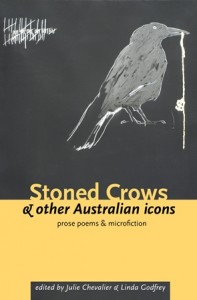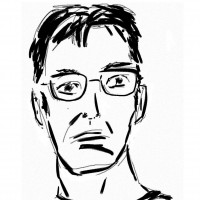1. What inspired you to write the prose poem/microfiction which is published in Stoned Crows & other Australian icons?
The Swimmer was written looking out on one of those mornings when the coastal horizon has been lost and the grey of sea and sky become one. The story came quickly as I watched a lone swimmer disappear into the misty distance and pondered the possibility that he might just as easily have really disappeared as simply been blanketed from view by the heavy atmosphere.
Bush Burial was one of those pieces that began as a series of experiments (into point of view, character and a fragmented storytelling style). It came after a conversation with my wife who had been involved, professionally, in the exhumation of human remains.
2. Tell us about your process. (Do you start sparse and widen out, or do you write down every possible association and cut back? Do you research the subject matter you are writing about? Is it pure intuition?) Take us through an example if you want.
The starting point for much of my fiction writing is the notion that stories exist in any set of circumstances. I love asking the question, what’s the story here. It’s a question that can take a writer to so many unexpected places. In this sense I usually start with little more than a notion. This might be a setting or a single character but could also be something less esoteric. Once in desperation I constructed a piece from the question, what’s the story with rice cookers. By putting that notion in a context and building around it a story takes shape. A man walks into a department store kitchen showroom. He spots two things, an attractive sales assistant and a rice cooker prominently displayed. His interest is in one only, but it is his feigned interest in the other that will allow him to satisfy that desire. A conversation ensues, ostensibly about food, but actually about a whole lot more.
3. What advice do you have for other writers ? about the first or last line? About how to choose the title? Do you follow any rules?
The first line doesn’t have to be the pointy end of the hook. But it does have to make the reader want to read the next line. I hate, as a reader, being part way through a story with no sense why it will be in my interest to persevere.
Likewise the last line doesn’t have to tie things up neatly, but it does need to leave the reader with a sense of completion, at least of the contract implied between the writer and reader. In very short fiction so much happens off the page that often the traditional conclusion is left for the reader to construct from the parts of the story the writer has given them.
As for titles I have started many stories with just the title. A title can be part of the story, can suggest a way the story might be read or can signpost the story in any number of ways. The only thing a title should not be is unconsidered. It’s a one off opportunity to embellish the text and, as such, is best not wasted.
4. Who or what inspires your writing?
Inspiration is hard to pin down. I’m inspired as much by the commitment and occasional brilliance of fellow writers struggling with first novels and dreams as I am by the great and well known. But there’s a single sentence near the start of Lord Jim to which I often return. It’s mad and unwieldy and completely seductive. It reminds me what writing can do. I’m inspired by the successes of my family and friends in the various fields that usually come under the ‘just getting on with life’ banner. And I’m inspired by the moments when I’ve surprised myself with the words I’ve written and the possibility that if I put words together they just might surprise me once more. In this way I’m like a hack golfer, returning again and again for that one sweetly hit drive, that isolated chip to within a metre of the pin and that perfectly read putt from the edge of the green.
5. Tell us what you do if you haven’t written anything in a while and you want to get started writing again? Could you share your favourite writing exercise with our readers?
Best advice is not to let ruts grow too deep, which is what happens when wheels are spinning. To counter this I like to practice what I laughingly call active procrastination. If the project I should be working on feels as if it might be getting bogged I’ll jump across to something else. Often that something else is microfiction. Writing anything is better than writing nothing so I always have side projects I can dip into.
It doesn’t matter what kind of project this is; a blog perhaps, or a diary, or those match reports from the under-10s that seem so peripheral but get read with enthusiasm on the team’s web site. And if all else fails and, as a writer, you need inspiration to even lift your fingers above the keyboard then try the best writing prompt I know. Collect smells. Try, for instance, that peculiar mix of hot metal and burnt oil that rises from the brakes of subway trains the world over. A smell like that can really take you places.

